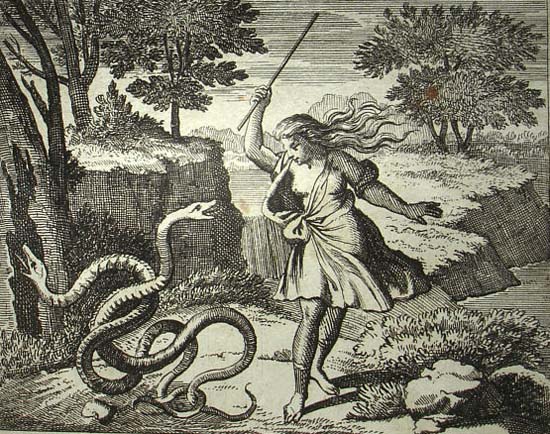Why Snakes Know About Sex

Tiresias and the Snake
Snakes know a thing or two about sex, we learn, from the story of Tiresias in Ovid’s Metamorphoses. There was no more appropriate creature to instruct Eve about it. When Tiresias encountered two snakes having sex, he rapped them with his stick but then he found himself changed into a woman. He deserved this, for he should not have interrupted them. Seven years later he came across another pair of snakes having sex and wondered if he rapped them whether it would reverse him back to a man. It did indeed and whether it was the snakes’ power or the gods’ to effect such changes, Ovid isn’t telling. But Ovid does place it in the context of an argument between Zeus and Hera over who has the greater pleasure from sex, men or women. I don’t know the answer to this question myself, but Zeus said women, Hera said men. Tiresias, having lived as both, agreed with Zeus that it was women. So Hera struck him blind. Zeus tried to compensate by giving him “second sight.” The snakes came out of it unscathed.
Tiresias also appears in Homer’s Odyssey and the classic Greek Oedipus plays, and in Dante’s Inferno and Milton’s Paradise Lost, in Tennyson and T.S. Eliot (did The Waste Land in turn inspire Virginia Woolf’s Orlando?). Nowadays Tiresias is an icon of the transgendered community and I’d like to think he is the source of the idea that too much sex can make you go blind.

The engraving of Tiresias above (with the breasts) is by Johann Ulrich Krauss, from a 1690 edition of Ovid’s Metamorphoses.
In France, Guillaume Apollinaire wrote the sweetly titled play The Breasts of Tiresias in 1903 (performed 1917). It is thought of as the play that coined the term "Surrealism."
I Tiresias, though blind, throbbing between two lives,
Old man with wrinkled female breasts, can see
At the violet hour, the evening hour that strives
Homeward, and brings the sailor home from sea...
- T.S. Eliot, The Waste Land
